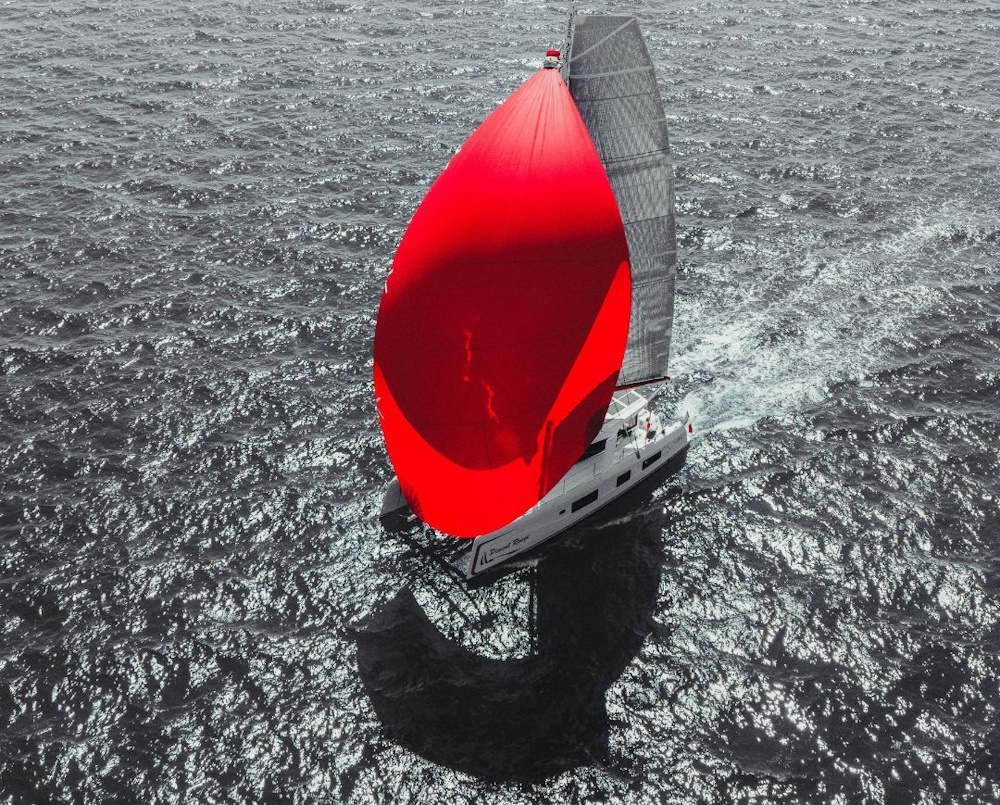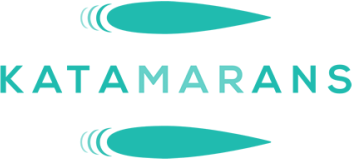ARC and ARC+ Rallies 2024 – Multihull Divisions
The 2024 Atlantic Rally for Cruisers (ARC) and ARC+, two celebrated ocean sailing events for cruisers concluded in December with some great performances in the multihull divisions. These rallies, spanning thousands of nautical miles, tested the endurance and skill of the crews as they crossed the Atlantic.
Catana was the clear winner this year on corrected time with a Catana Ocean Class winning both races. An MC75 took the line honours in the ARC, while an Outremer was first over the line in the ARC+

Here’s a detailed look at the top 10 multihulls in each race, including their positions, times, race durations, and noteworthy updates.
ARC 2024: Gran Canaria to St. Lucia. Corrected Times.
The ARC’s primary route covers around 2,700 nautical miles from Las Palmas, Gran Canaria, to Rodney Bay, St. Lucia. The multihull division saw a tight contest with varying wind patterns and competitive sailing.
Samourai (Catana 50)
Position: 1st
Finish Time (UT): 10-Dec-24 12:07:02
Corrected Time: 17 days, 6 hours, 18 minutes
Maintained a steady lead thanks to strategic routing and an experienced crew.
Inez V (Outremer 52)
Position: 2nd
Finish Time (UT): 09-Dec-24 17:02:26
Corrected Time: 18 days, 10 hours, 53 minutes
Reported excellent teamwork and efficient handling during trade wind conditions.
Misfit (Catana 65)
Position: 3rd
Finish Time (UT): 09-Dec-24 07:25:23
Corrected Time: 18 days, 14 hours, 54 minutes
Overcame mid-race equipment challenges to secure a podium position.
Addiction (Outremer 5X)
Position: 4th
Finish Time (UT): 09-Dec-24 03:22:41
Corrected Time: 18 days, 16 hours, 45 minutes
News: Achieved a strong finish thanks to exceptional crew coordination. Second over the line after Jack, an MC75.
Balavu (Outremer 55)
Position: 5th
Finish Time (UT): 09-Dec-24 20:44:59
Corrected Time: 18 days, 17 hours, 1 minute
News: Consistent performance across the crossing.
Akoya (Outremer 55)
Position: 6th
Finish Time (UT): 09-Dec-24 19:57:26
Corrected Time: 19 days, 13 hours, 47 minutes
News: Recovered well from initial light wind patches.
Avel Vaez (Marsaudon ORC 57)
Position: 7th
Finish Time (UT): 09-Dec-24 04:56:46
Corrected Time: 19 days, 16 hours, 48 minutes
News: Utilized excellent sail handling to navigate variable winds.
Falmari (Outremer 45)
Position: 8th
Finish Time (UT): 11-Dec-24 13:25:15
Corrected Time: 19 days, 18 hours, 21 minutes
News: Celebrated their arrival with a jubilant crew.
YANEL (Neel 47)
Position: 9th
Finish Time (UT): 13-Dec-24 12:59:27
Corrected Time: 20 days, 10 hours, 15 minutes
News: Crew highlighted the camaraderie and resilience displayed throughout the crossing.
Five Oceans (Marsaudon ORC50)
Position: 10th
Finish Time (UT): 10-Dec-24 21:44:48
Corrected Time: 21 days, 1 hour, 39 minutes
Noted for innovative navigation strategies in challenging conditions.
ARC+ 2024: Cape Verde to Grenada. Corrected Times.
The ARC+ offered a more southerly route, breaking the journey into two legs: Gran Canaria to Cape Verde, then Cape Verde to Grenada. The multihull division in this route showcased determination and adaptability over approximately 2,100 nautical miles from Cape Verde to Grenada.
Piment Rouge (Catana Ocean Class 50)
Position: 1st
Finish Time (UT): 04-Dec-24 13:39:50
Corrected Time: 13 days, 8 hours, 4 minutes
Set a course record for the ARC+ multihull division.
Narganá (Fountaine Pajot Aura 51)
Position: 2nd
Finish Time (UT): 05-Dec-24 09:23:19
Corrected Time: 13 days, 14 hours, 56 minutes
Demonstrated exceptional speed and strategic planning.
O’Vive (Catana Ocean Class 50)
Position: 3rd
Finish Time (UT): 04-Dec-24 21:13:33
Corrected Time: 13 days, 22 hours, 1 minute
Showcased excellent spinnaker work during trade wind conditions.
Oxane (Outremer 49)
Position: 4th
Finish Time (UT): 04-Dec-24 10:20:51
Corrected Time: 14 days, 5 hours, 6 minutes
Praised for well-coordinated maneouvres and high morale.
Twin Joy (Lagoon 50)
Position: 5th
Finish Time (UT): 06-Dec-24 09:49:35
Corrected Time: 14 days, 5 hours, 50 minutes
Crew enjoyed the journey, with stunning wildlife sightings en route.
Salto (Outremer 52)
Position: 6th
Finish Time (UT): 03-Dec-24 20:17:10
Corrected Time: 14 days, 13 hours, 40 minutes
News: Recovered well from initial challenges and finished strong.
Atlas (Outremer 51)
Position: 7th
Finish Time (UT): 04-Dec-24 16:45:50
Corrected Time: 14 days, 14 hours, 41 minutes
News: Crew’s enthusiasm and skill ensured a smooth crossing.
Duet (Excess 14)
Position: 8th
Finish Time (UT): 06-Dec-24 21:40:08
Corrected Time: 14 days, 20 hours, 23 minutes
Celebrated their arrival in style.
Appa (Outremer 52)
Position: 9th
Finish Time (UT): 04-Dec-24 07:17:55
Corrected Time: 15 days, 12 hours, 56 minutes
Smooth sailing with few technical hiccups.
Salt (Excess 14)
Position: 10th
Finish Time (UT): 07-Dec-24 09:38:20
Corrected Time: 15 days, 20 hours, 4 minutes
Crew shared their experiences of teamwork and determination.
So How do the Handicaps work in the ARC rally?
In the Atlantic Rally for Cruisers (ARC), handicaps are used to ensure fair competition among a variety of yachts with different designs, sizes, and capabilities. Here’s an overview of how the handicap system works in the ARC rally:
- Time Correction Factor (TCF)
The ARC uses a handicap rating system to calculate corrected times, allowing yachts of different speeds to compete fairly.
The TCF is applied to the yacht’s elapsed time (actual time taken to sail the course) to calculate the corrected time. - Rating Systems
The ARC typically uses established handicap systems such as:
World Sailing Offshore Special Regulations (ORC) or
International Rating Certificate (IRC).
These systems consider factors such as:
– Boat length
– Sail area
– Displacement
– Design features - Performance Cruising Adjustments
Many ARC participants are cruising yachts rather than pure racers. To account for this:
Adjustments are made for comfort features (e.g., generators, furling sails).
Penalties or allowances may apply for using powered winches, autopilots, or engines. - Division-Specific Handicaps
The ARC is divided into several classes or divisions (e.g., Racing, Cruising, Multihull):
– Racing Division: Uses stricter handicaps like IRC or ORC.
– Cruising Division: Focuses on a more relaxed handicap, often adjusted manually.
– Multihull Division: Uses separate calculations for catamarans and trimarans. - Engine Use Declaration
In the Cruising Division, engine use is permitted, but participants must declare it. Penalty time is added based on the hours the engine was used. - Calculation of Results
The corrected time is calculated using the formula:
Corrected Time=Elapsed Time×TCF
The yacht with the lowest corrected time in its division is declared the winner. - Spirit of the Rally
While handicaps allow for fair competition, the ARC emphasizes the camaraderie and adventure of the transatlantic crossing more than the competitive aspect.
If you’re entering the ARC, your yacht’s specific handicap will be determined when you register, based on the technical data provided about your boat.
Conclusion
The 2024 ARC and ARC+ multihull rallies delivered some unforgettable memories. The winner overall this year on corrected time? Catana. McConaghy and Outremer took the line honours.
